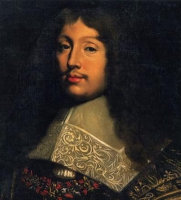| François de La Rochefoucauld,Prince de Marcillac | |
| fú lǎng suǒ wǎ · dé · lā luó shí fù kē gōng jué, mǎ xī yà kè qīn wáng | |
| fú lǎng suǒ wǎ · dé · lā luó shí fù kē | |
| | |
弗朗索瓦·德·拉罗什富科公爵,马西亚克亲王(法语:François de La Rochefoucauld,Prince de Marcillac,1613年9月15日─1680年3月17日),法国箴言作家。
生平
生于巴黎一个贵族家庭,早年热衷政治,但政途蹇连;1630年代他成为隆格维尔夫人的裙下臣,又与王后奥地利的安妮过从甚密,并加入推翻首相利希留的阴谋计划,却不断失败。1643年安妮摄政后,他是“显要集团”的成员,却终在投石党运动中焦头烂额,于战斗时中枪而长期失明、失宠,被迫退居乡间,进入以塞维涅夫人、拉斐特夫人为代表的沙龙圈子(尤与后者过从密切),并潜心著作,直至逝世。
1662年,有人未经他的准许、校改而出版了《回忆录》(Memoires),书中的敏感内容惹怒了不少人。1665年出版《箴言集》(Réflexions ou sentences et maximes morales,简称Maximes),以犀利的笔调无情地讽刺了人类的愚蠢;其内容质疑人类一切高贵行为背后的动机,开卷第一条即说:“男因勇气而神勇,女因节操而守节,此未必然也。”(... et ce n'est pas toujours par valeur que les hommes sont vaillants et que les femmes sont chastes.)拉罗什富科一句有关爱情的箴言常被后世引用:“真爱犹如鬼魅:众口相传,然尝目击者,鲜矣。”(Il est du véritable amour comme de l'apparition des esprits: tout le monde en parle, mais peu de gens en ont vu.)(《箴言集》第76条) 即使不少人以道德的名义谴责作者深刻的利己主义思想,但所有人都承认这部两部作品巨大的文学价值。
拉罗什福科对善与真充满了怀疑,在人的行为中只看到自私、虚荣和妒忌。“人如果不互相欺骗就无法在社会中存在。”因而在箴言集中,一半是消极的。但也有一些正直男女的动机和行为肯定,以及形成崇高人性的因素描述:勇气、友谊、知恩图报,以及真正的爱情!
参考文献
- (法)巴亚尔 等著、黄艳红 等译,《法国史图说》,上海:上海人民出版社,2005年
